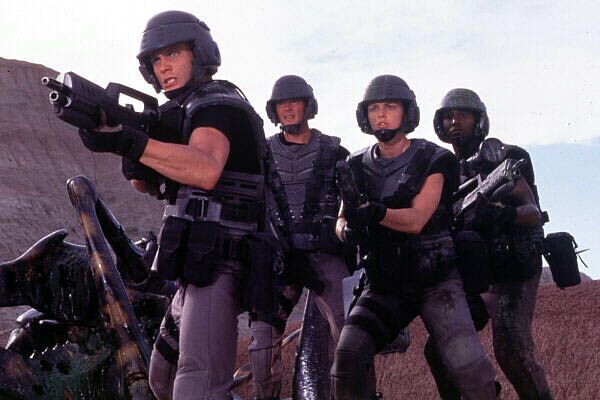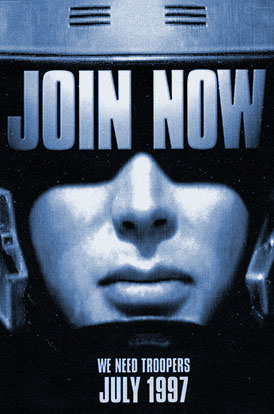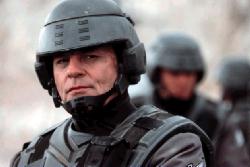Heinlein’s novel is often criticized of being highly militaristic. There is some amount of truth to the claim as Johnny journeys through training. The military is incredibly tough with death a regular part of training. Training's purpose is to weed out the people who were not absolutely 100% committed into becoming recruits. This idea starts at the very beginning of training where the military recruiter tells you time and time again how horrible it is to be in the service. This goes all the way up until even after you have become a cap-trooper where you are constantly told that if you don’t want to jump than you just sign your resignation papers and go home.
“It was the firm opinion of every recruit that this was sheer meanness, calculated sadism, fiendish delight of witless morons in making other people suffer.
It was not. It was too scheduled, too intellectual, too efficiently and impersonally organized to be cruelty for the sick pleasure of cruelty; it was planned like surgery for purposes as unimpassioned as those of a surgeon... That’s what it was: surgery. Its immediate purpose was to get rid of, run right out of the outfit, those recruits who were too soft or too babyish ever to make Mobile Infantrymen. It accomplished that, in droves. (They darn near ran me out.) Our company shrank to platoon size in the first six weeks.” P. 53-54
According to the recruit this amount of dissuasion was necessary so that you knew the guy dropping next to you was as capable and willing as you were to fight. This ensured a tight line between the men that gave everyone confidence in their fellow man. This was also the basis of his theories of social leadership. The only people eligible to vote are those that have served in the armed forces. The belief is that only people who risk their own life to save everyone else are willing to put everyone's needs before their own. Weeding out the weak was another method of ensuring that only the people who truly wished to put the body politic ahead of their own lives were capable of exercising the proper judgment in order to partake in politics.
Naturally, however, this can lead to skewed portions of the population. It is worth noting that while women can serve as pilots or in some other noncombat positions, that they cannot serve in any physical combat. The reason for this is not explained, but may be due to his influence in the navy which had similar policies at the time. Also, however not mentioned in the novel, it is likely that having to serve in the military in order to vote would militarize society further. Soldiers more than anyone else understand the policy of kill or be killed and are likely to resort to military force. The bugs which the soldiers fight against in the novel are never explained as to why they are fighting which also hints towards the militarization present at the time. There is an enemy to fight and they better fight back.
A quote illustrates my point nicely,
“War is not violence and killing, pure and simple; war is controlled violence, for a purpose. The purpose of war is to support your government’s decisions by force. The purpose is never to kill the enemy just to be killing him… but to make him do what you want him to do. Not killing… but controlled and purposeful violence. But it’s not your business to decide when and how—or why—he fights; that belongs to the statesmen and the generals. The statesmen decide why and how much; the generals take it from there and tell us where and when and how. We supply the violence; other people—‘older and wisher heads,’ as they say—supply the control.” P. 63
Firstly they believe that violence is an appropriate tool for political purposes. War is no longer a last resort as most modern democratic societies like to pretend to believe, but instead as one of a multitude of options that statesmen can choose from. This mentality helps contribute to wars such as World War I where no grievances are truly solved and basically everyone ends up losing in the end. Lt. Colonel Dubois who is Johnny Rico’s History and Moral Philosophy teacher as well as general mentor throughout his training speaks of how violence has “settled more issues in history than has any other factor.”
|



